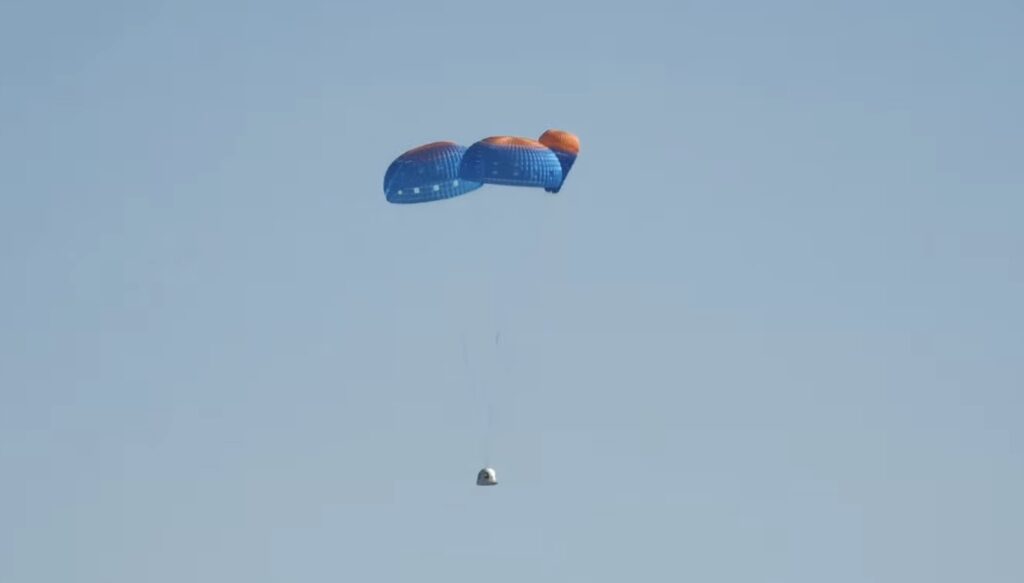KENNEDY SPACE CENTER, Fla. – A parachute failed to fully inflate on Blue Origin New Shepard’s last suborbital flight because a line controlling its expansion did not cut as planned.
One of the three parachutes on New Shepard’s crew capsule did not fully inflate during the capsule’s descent on the NS-25 mission on May 19. The other two parachutes operated normally and the capsule landed without incident.
During a May 31 briefing about the upcoming test flight of the Boeing CST-100 Starliner, NASA officials said they were informed by Blue Origin of the parachute issue since parachutes on other vehicles, such as the Starliner, use similar components. .
Steve Stich, NASA’s commercial crew program manager, said the parachutes are designed to open in stages, called reefing, to limit the loads on the parachutes. “In this case, one of the parachutes was stuck in what I would call the first stage” of the exchange process, he said, limiting the opening of the parachute.
This is controlled by a band or line on the throat of the parachute. “What was seen was that the cutters, for some reason, didn’t cut that line,” he said. The parachutes on the Starliner use a similar trimmer, but Stich said testing showed no evidence of any problems with those used on the Starliner. This provided the “flight justification” to continue launching the Starliner.
He praised Blue Origin for sharing information about the parachute issue. “It’s a small group of people who work on these parachutes,” he said, including people at Blue Origin, Boeing, NASA and SpaceX. “They’ve been great about sharing data with us. They don’t have any kind of root cause yet, and we continue to follow along with them.”
Blue Origin, however, has released little information to the public about the case and the parachute investigation, failing to mention it in its mission announcement.
“Our New Shepard system uses three parachutes and is designed to land safely with only one deployed,” a company spokesperson told SpaceNews on May 31. “We perform full post-flight reviews of every flight system and this analysis continues. We continue to share data and analysis of our parachute deployment with our gap supplier, NASA and launch providers.”
Parachutes have created problems for some manned vehicles that use them. The Starliner crew test flight was postponed from last year in part to replace parachute components called “soft links” that did not have adequate safety margins. SpaceX faced its own challenges developing parachutes for the Crew Dragon spacecraft, and recently noticed that one of the four parachutes opened more slowly than the others during deployment, but was fully inflated.
The problems with the parachutes illustrate the challenges inherent in their design, despite decades of experience using them in spaceflight. “It’s the only system you’re looking to assemble yourself in flight,” said Jim McMichael, senior manager of technical integration in NASA’s commercial crew program, during an interview before a previous Starliner launch attempt.
Parachute deployment occurs in a “chaotic environment” influenced by factors such as the wake the spacecraft creates behind it in the atmosphere as it descends. “Even today, with all the technology we have and everything else, as far as we’ve come with parachutes, we still can’t design an inflatable parachute,” he said. However, once it starts to inflate, the models can accurately predict the loads on the system.
“Looks like it should be easy,” he concluded. “It’s still a little difficult.”



